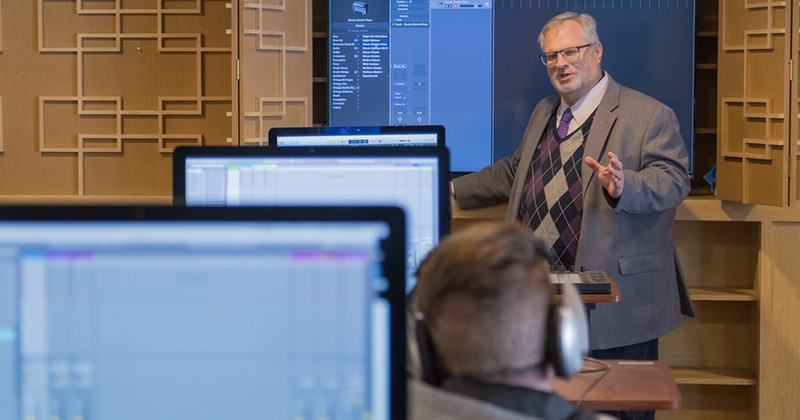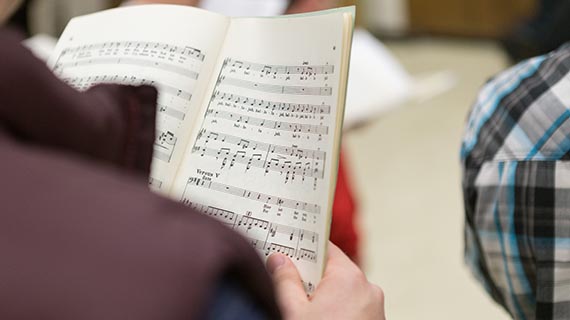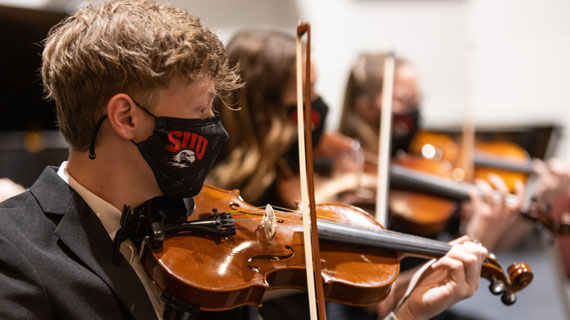What is a Master of Music Education?
Posted: August 03, 2020 | Author: Madalyn Bushman | Read Time: 3 minutes

Music educators play a crucial role in teaching basic principles of music, directing ensembles, overseeing equipment and instrument maintenance and inventory, and advocating for the importance of arts in educational institutions. With so many responsibilities, it can be easy to feel overwhelmed, especially in the initial years of teaching music in a school setting. Acquiring a Master’s Degree in Music Education is among the most beneficial steps a music educator can take to enhance their skills and confidence.
Let’s take a look into what a Master of Music Education is, how the program is structured at SUU, why it’s important, and what you can do after you graduate.
What is a Master of Music Education?
“Our Master of Music Education program is designed specifically for practicing music teachers who want to continue working while obtaining their degree,” said Director of Graduate Music Education, Dr. Thomas Herb. “We understand the life of a music educator. We know what the schedule is like, so we build our schedule around it. We understand the needs of teachers and what they need to take the next steps in their careers. Our program is built to help music teachers succeed.”
Graduates will gain a unique insight into modern pedagogical trends in music education and leadership skills that will in turn make a music program strong.
In addition, graduates will learn skills to help manage all of the aspects of teaching that fall outside the realm of understanding basic music pedagogy and theory.
How is the Master of Music Education Program structured?
The Master of Music Education is designed to fit busy educators’ schedules with a teacher-centric schedule. This involves online courses during the spring and fall semesters and on-campus sessions during the summer which are three-week courses in June.
SUU’s Master of Music Education program requires 30 credits for completion and can be completed in as few as 13 months.
Within the 30 credits, students will complete 10 elective credits, giving them the freedom to design their master’s degree that is aligned with their interests and professional goals within the music education program.
Students can explore specialized topics such as:
- Private conducting lessons
- Composing for your school groups
- Instrument repair
- Utilizing music software programs
- Recording techniques for your ensembles
- Teaching music production courses
- Private lessons in secondary areas
Additionally, students have the opportunity to explore directed reading courses that cover subjects like:
- Recruitment strategies
- Classroom management
- Program advocacy
- Student leadership programs
- Finally, students can explore specialized pedagogy courses such as:
- Vocal
- Jazz
- Marching band
- Bornoff string pedagogy
SUU’s Master of Music Education program empowers students to shape their educational journey by designing a degree that fits their interests and professional goals all while offering flexibility and affordability.
Why is a Master of Music Education important?
The teacher training that music educators receive in bachelor’s and certification programs is essential to getting started teaching music in schools. But like most fields of study, there is always more to learn.
Along with a very desirable pay raise, a master’s degree in music education brings the graduate a set of essential skills for coming into their own as a music educator. There is so much more to teaching music than simply teaching music. SUU acknowledges that and has circled this program to help educators overcome some of the hurdles they are facing so they can effectively share a love of music with their students.
Obtaining a Master of Music Education can also significantly boost graduates' competitiveness as job candidates. Listed below are several career opportunities for which graduates may qualify:
- K-12 Music Teachers
- Postsecondary (College or University) Music Teachers
- Private Instrument Teacher
- District Supervisor of Music
- Music Administration
Enrolling in SUU’s Master of Music Education program isn’t just a logical next step for music educators; it's a crucial element in becoming an outstanding teacher. A graduate degree equips music educators with the necessary tools to excel in their career.
Graduates can leverage research skills to advance their goals, effectively manage resources, and contribute a unique perspective on musical pedagogy to the educational institutions where they teach.
Also, graduates from SUU’s Master of Music Education program emerge as educators who are not only more competitive but also more competent and well-rounded in their profession.
This article was published more than 3 years ago and might contain outdated information or broken links. As a result, its accuracy cannot be guaranteed.




